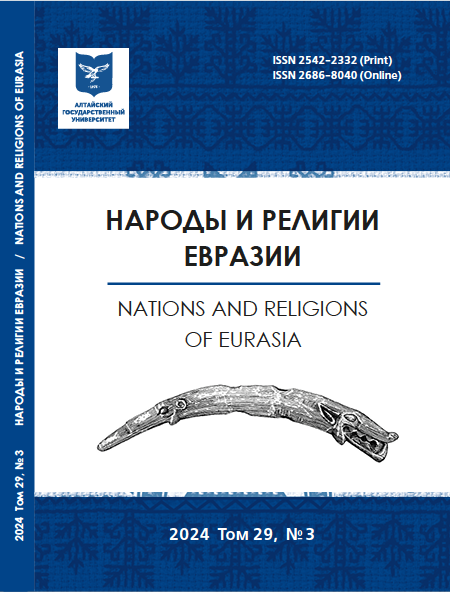Ethnic vs local identity of the Chuvash cyberspace (based on social networks VKontakte and Odnoklassniki)
Main Article Content
Abstract
This article explores the representation of ethnicity in cyberspace by studying the online activities of participants in rural communities on the social networks VKontakte and Odnoklassniki. The research aims to determine the relationship between the ethnic and local identities of residents in Chuvash villages, specifically how these identities are represented online. It focuses on characterizing representational practices within groups and communities from five regions of concentrated Chuvash habitation in the Ural-Volga region. The study highlights the role and significance of the ethnic factor in shaping the virtual landscape of Chuvash villages. It examines how ethnocultural heritage is represented and evaluates the content and demand for ethnically specific (Chuvash) information among village residents. Findings indicate that ethnicity plays a critical role in the virtual self-identification of users, closely tied to their local identity. This connection primarily manifests in their relationship with their «small motherland or birthplace.» Participation in regional and all-Chuvash groups fosters a strong sense of support within the broader «Chuvash world» on the Internet.
Downloads
Metrics
Article Details

This work is licensed under a Creative Commons Attribution 4.0 International License.
References
Белоруссова С. Ю. Коренные малочисленные народы России: виртуальная этнич-ность и сетевые опыты // Этнография. 2022. № 4 (18). С. 84-111.
Белоруссова С. Ю. Нагайбаки в киберпространстве // Кунсткамера. 2018. № 1. С. 71-77.
Волокитина Н. А. Этническая культура и репрезентация идентичности в интернет-пространстве // Культурология, 2019. № 3 (33). С. 39-45.
Головнёв А. В., Белоруссова С. Ю., Киссер Т. С. Веб-этнография и киберэтничность // Уральский исторический вестник. 2018. № 1 (58). С. 100-108.
Головнев А. В., Белоруссова С. Ю., Киссер Т. С. Виртуальная этничность и киберэтнография. СПб.: МАЭ РАН, 2021. 280 с.
Киссер Т. С. Виртуальная идентичность российских немцев // Сибирские исторические исследования. 2019. № 2. С. 64-84.
Киссер Т. С. Российские немцы: религиозность онлайн // Этнография. 2020. № 3 (8). С. 103-123.
Махмутов З. А., Габдрахманова Г. Ф. Особенности этнической идентичности виртуальных татарских сообществ в социальной сети ВКонтакте // Историческая этнология. 2016. Т. 1. № 2. С. 276-292.
Нечаева А. А. Проблема конструирования валлийской идентичности в XXI в. на страницах интернет-сайтов // Этнография. 2020. № 3 (9). С. 154-168.
Разумова И. А., Сулейманова О. А. Саамские сетевые сообщества в «этническом интернете» России // Ученые записки Петрозаводского государственного университета. 2021. № 2 (179). С. 114-122.
Сибгатуллин А. А. Татарский Интернет. Нижний Новгород : ИД «Медина», 2008. 60 с.

